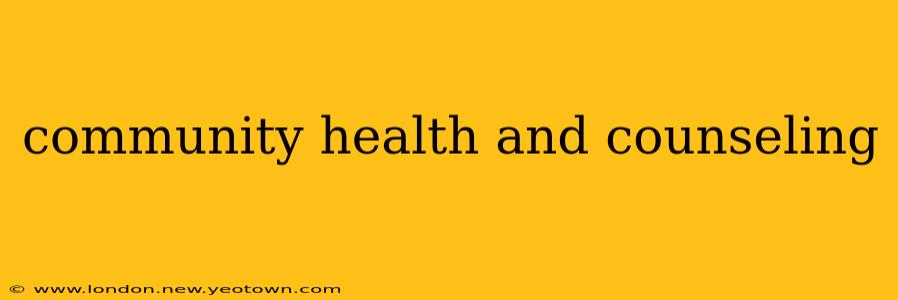Imagine a world where everyone has access to the support they need to thrive. That's the heart of community health and counseling – a field dedicated to improving the well-being of individuals and entire communities. It's not just about treating illness; it's about preventing it, promoting healthy lifestyles, and fostering resilience. This journey into the world of community health and counseling will explore its multifaceted nature, addressing crucial questions and highlighting its profound impact.
What is Community Health and Counseling?
Community health and counseling isn't confined to the sterile walls of a clinic. Instead, it's a dynamic field where professionals work in diverse settings, from schools and community centers to homeless shelters and prisons. They're the unsung heroes, addressing the complex interplay of social, economic, and environmental factors that influence health. These professionals use a holistic approach, recognizing that mental and physical health are intertwined and significantly affected by a person's social context. They work directly with individuals, families, and groups, offering a range of services including therapy, education, advocacy, and prevention programs.
What are the Roles and Responsibilities of a Community Health Counselor?
This isn't a one-size-fits-all profession. The daily tasks of a community health counselor vary greatly depending on their specific role and the community they serve. However, some common threads weave through their work:
-
Direct Client Services: This includes providing individual and group counseling, crisis intervention, and case management. Think of guiding someone through a difficult divorce, helping a family navigate the challenges of a child's illness, or supporting an individual struggling with addiction.
-
Community Outreach and Education: These professionals often organize workshops, present at schools and community events, and develop educational materials to promote mental health awareness and healthy lifestyles. They might teach stress-management techniques, run support groups for caregivers, or provide substance abuse prevention programs.
-
Program Development and Management: Many community health counselors play a critical role in designing and implementing public health programs. This could involve securing funding, recruiting volunteers, coordinating services, and evaluating program effectiveness. They might develop a program to address youth violence or create a support system for individuals experiencing homelessness.
-
Advocacy and Policy: They often advocate for policy changes that benefit their communities. This could involve lobbying for increased funding for mental health services, supporting legislation to address social determinants of health, or working to reduce health disparities.
What Education and Training are Needed to Become a Community Health Counselor?
The path to becoming a community health counselor varies. While a master's degree in social work (MSW), counseling, or a related field is typically required, the specific requirements will depend on the desired role and state licensing regulations. Many professionals also pursue additional certifications in areas like substance abuse counseling, trauma-informed care, or school counseling. The field values experience, so internships and volunteer work are incredibly beneficial in gaining valuable hands-on experience.
What are the Different Settings for Community Health and Counseling?
The beauty of community health and counseling is its adaptability. These professionals work in a vast array of settings, each presenting unique challenges and rewards:
-
Schools: Providing counseling and support services to students and their families, addressing issues like academic stress, bullying, and mental health concerns.
-
Hospitals and Clinics: Working as part of a healthcare team to provide integrated mental health services alongside physical healthcare.
-
Community Centers: Offering a range of services to diverse populations, including counseling, support groups, and health education programs.
-
Non-profit Organizations: Working for organizations that focus on specific populations or issues, such as homeless shelters, domestic violence centers, or organizations serving individuals with disabilities.
-
Government Agencies: Public health departments and other government agencies often employ community health counselors to plan and implement health programs.
How Can Community Health and Counseling Improve Population Health?
Community health and counseling plays a vital role in improving population health outcomes by:
-
Addressing Social Determinants of Health: By tackling issues like poverty, lack of access to healthcare, and food insecurity, these professionals help create healthier communities for everyone.
-
Promoting Prevention and Early Intervention: Early intervention is key to addressing mental health concerns and preventing more serious issues from developing.
-
Reducing Health Disparities: By working with marginalized populations, community health counselors help to reduce inequalities in access to care and improve health outcomes across communities.
-
Improving Access to Care: Community health counselors often work in areas with limited access to mental health services, ensuring that those in need can receive the help they deserve.
The work of community health counselors is essential to building healthier and more resilient communities. Their dedication to improving the well-being of individuals and populations is a testament to the power of compassionate care and proactive intervention. It's a field brimming with purpose, offering the opportunity to make a tangible difference in the lives of others.

